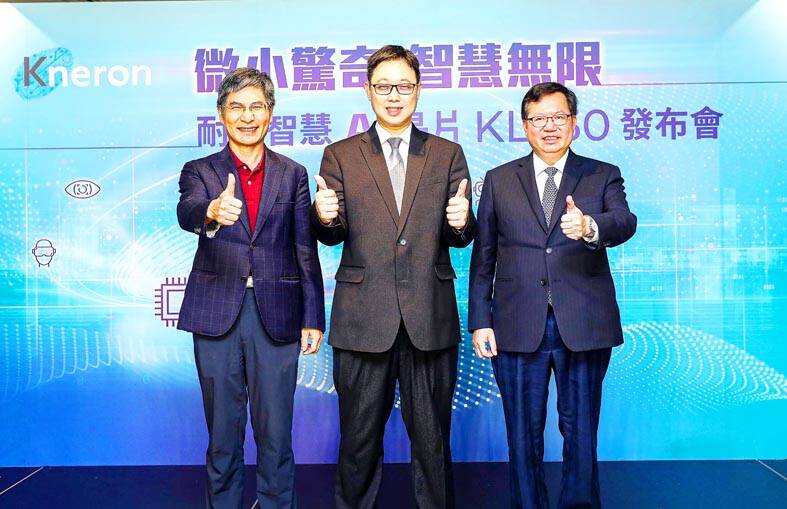Artificial intelligence (AI) chip start-up Kneron Inc (耐能) yesterday unveiled a cost-saving and energy-efficient alternative to Nvidia Corp’s graphic processing units (GPUs) for generative pre-trained transformer (GPT) solutions at scale.
Its new KL730 AI chip deploys Taiwan Semiconductor Manufacturing Co’s (TSMC, 台積電) 12-nanometer process technology for production, Kneron said.
Kneron, based in San Diego, California, is known for pioneering the neural processing unit (NPUs), a special circuit for machine learning algorithms.

Photo courtesy of Kneron Inc
“People have been brainwashed that only GPUs can do AI. GPUs are good at rendering graphics and images, and at optimizing the gaming experience, but high costs and heavy energy consumption make GPUs unaffordable for average businesses and individuals to adopt for AI applications,” Kneron founder and CEO Albert Liu (劉峻誠) told a news conference in Taipei.
“Kneron’s NPU is an AI-dedicated chip and able to do what a GPU can do today, but at a much lower cost,” Liu said.
Quanta Cloud Technology Inc (雲達科技) and Chunghwa Telecom Co (中華電信) have saved up to 75 percent in operational costs after using Kneron’s KL720 NPU in their servers, Liu said.
The KL730 can perform even better, he said.
The KL730 is also 150 to 200 percent more energy-efficient than products manufactured by major industry peers, the company says.
Automakers from Germany and Japan have shown an interest in adopting the KL730 for full-frame detection, a key feature of advanced driver-assistance systems, Liu said.
Liu said he expects autonomous vehicles to become the largest application for NPUs due to their higher average selling prices, followed by servers.
Kneron counts Quanta Cloud, Chunghwa Telecom and South Korea’s Naver Corp among its server customers.
South Korea’s Hanwha Group has adopted its AI chips for use in surveillance cameras, Kneron said.
The KL730 would be available for sampling by customers by the end of this year, the company said, adding that it can be used for enterprise-edge servers, smart home applications and advanced driver-assistance system applications.
Established in 2015, Kneron has raised more than US$140 million, backed by investors including Qualcomm Ventures, Hon Hai Precision Industry Co (鴻海精密), Horizons Ventures Ltd and Sequoia Capital.
Apart from TSMC, GlobalFoundries Inc and United Microelectronics Corp (聯電) are also Kneron foundry partners.

Three experts in the high technology industry have said that US President Donald Trump’s pledge to impose higher tariffs on Taiwanese semiconductors is part of an effort to force Taiwan Semiconductor Manufacturing Co (TSMC, 台積電) to the negotiating table. In a speech to Republicans on Jan. 27, Trump said he intends to impose tariffs on Taiwan to bring chip production to the US. “The incentive is going to be they’re not going to want to pay a 25, 50 or even a 100 percent tax,” he said. Darson Chiu (邱達生), an economics professor at Taichung-based Tunghai University and director-general of

‘LEGACY CHIPS’: Chinese companies have dramatically increased mature chip production capacity, but the West’s drive for secure supply chains offers a lifeline for Taiwan When Powerchip Technology Corp (力晶科技) entered a deal with the eastern Chinese city of Hefei in 2015 to set up a new chip foundry, it hoped the move would help provide better access to the promising Chinese market. However, nine years later, that Chinese foundry, Nexchip Semiconductor Corp (合晶集成), has become one of its biggest rivals in the legacy chip space, leveraging steep discounts after Beijing’s localization call forced Powerchip to give up the once-lucrative business making integrated circuits for Chinese flat panels. Nexchip is among Chinese foundries quickly winning market share in the crucial US$56.3 billion industry of so-called legacy

Taiwan Semiconductor Manufacturing Co (TSMC, 台積電) yesterday held its first board of directors meeting in the US, at which it did not unveil any new US investments despite mounting tariff threats from US President Donald Trump. Trump has threatened to impose 100 percent tariffs on Taiwan-made chips, prompting market speculation that TSMC might consider boosting its chip capacity in the US or ramping up production of advanced chips such as those using a 2-nanometer technology process at its Arizona fabs ahead of schedule. Speculation also swirled that the chipmaker might consider building its own advanced packaging capacity in the US as part

A move by US President Donald Trump to slap a 25 percent tariff on all steel imports is expected to place Taiwan-made steel, which already has a 25 percent tariff, on an equal footing, the Taiwan Steel & Iron Industries Association said yesterday. Speaking with CNA, association chairman Hwang Chien-chih (黃建智) said such an equal footing is expected to boost Taiwan’s competitive edge against other countries in the US market, describing the tariffs as "positive" for Taiwanese steel exporters. On Monday, Trump signed two executive orders imposing the new metal tariffs on imported steel and aluminum with no exceptions and exemptions, effective